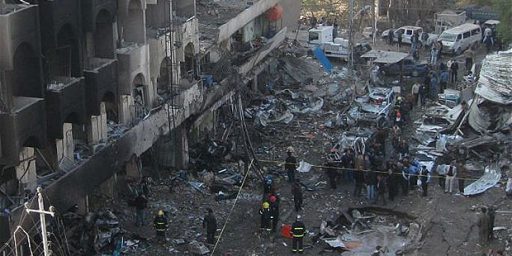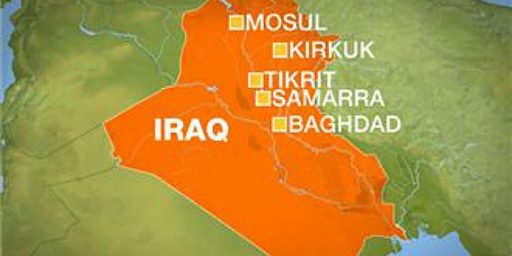McCain Conference Call
Senator John McCain held a conference call this afternoon with some invited bloggers (Ana Marie Cox got a question in toward the end, so it apparently wasn’t limited to conservatives) to discuss his recent trip to Iraq and the recent setbacks in his campaign. As one might expect, he was rather bleak on both counts.
I got the second question, which turned into a rather long back-and-forth. I asked that, given the recent reports confirming that the Maliki government is making next to no progress in unifying the country and making needed reforms, why he had any hope at all that this would change.
Like me, he’s incredibly “frustrated” by this situation. He discussed this with Maliki personally and essentially got no response. He thinks there’s “still an opportunity” that with “hard work” Ambassador Crocker and others can convince them of the urgency of reform. He hopes that we can convince them that they are “staring at the abyss” and things will get even worse if they don’t get it turned around.
In response to his earlier statement that he didn’t think we’d lost yet, I asked him how we’d know if we had. He admits he really doesn’t know. He thinks that we’ll probably know by the time we get the September progress report and that we can see whether there has been enough progress on key points. Unfortunately, as he later noted in response to a question from John Hinderaker, it’s quite likely that the enemy will redouble their efforts “around Labor Day” to make sure things are bad in September.
Like me, he’s holding out hope that we can fix things without much evidence because, quite frankly, the consequences of admitting failure and withdrawing our forces may well be catastrophic. It’s more likely than not, though, that we’re just delaying the inevitable.






Given the fact that–at least according to Bush–Al Quaeda has grown from a fringe terrorist group in 2001 armed with supplies you can find in a dollar store to a force, today, that is capable of prolonged engagement with the most sophisticated military in the history of humanity, I doubt that the situation is going to change much in the next eight weeks.
Well, al Qaeda was certainly not a mere fringe group in 2001. I’m not sure it’s even true that they’re stronger now than they were in 2001, merely that they have largely rebuilt after seeming to be decimated in 2003. Regardless, theire effectiveness is in resolve and personnel, not equipment. We still trump them there.
More importantly, though, al Qaeda is but a tiny part of the issue in Iraq. There’s a major regional crisis potentially afoot that goes beyond the terrorism issue.
I don’t necessarily disagree with you–I was trying to understand the Bush/McCain logic.
While you may think that Al Qaeda is a “tiny part of the issue,” in Iraq, Bush/McCain think otherwise.
By Bush’s own admission, his strategy for combatting Al Qaeda has been a dismal failure and not progressed since he took office. As he said yesterday, “The same folks that are bombing innocent people in Iraq were the ones who attacked us in America on September the 11” and that we are likely facing “mass killings on a horrific scale” if the war ended today.
Given the billions of dollars he has put into the fight and the thousands of people that have been killed over the past six years, one would expect some better results than to have the country still possibly facing “mass killings on a horrific scale.”
As you mention, McCain doesn’t seem to have any plan other than to continue Bush’s failures.
…quite frankly, the consequences of admitting failure and withdrawing our forces may well be catastrophic. It’s more likely than not, though, that we’re just delaying the inevitable.
First, it should be pointed out that this delay is not cost free. As the NY Times pointed out today
It would seem that Kerry’s much maligned phrase, “No one wants to be the last man to die for a mistake” is going to be the de facto reality of our troops.
Second, I find it amazing that you seems unable to entertain the possibility that our “delaying the inevitable” won’t make the “catastrophic” even more catastrophic. By McCain’s (and yours, apparently) own admission, he doesn’t have a clue as to what to do, where things are going and even how to measure success or failure. So, wrt to the inability to measure success of failure, it’s strange to hear people who can’t measure something say that it “will be even worse” when they can’t even figure out trajectories in the existing situation, much less if something else happens.
Training and equipping the Iraqis to do an even better job of committing genocide when we “inevitably” leave seems completely irresponsible and not at all something that’s a bulwark against disaster. It seems like making an inevitable disaster even worse.
But I guess I’m just a caveman and your modern millitary ways are simply baffling and confusing to me.
Like me, he’s holding out hope that we can fix things without much evidence because, quite frankly, the consequences of admitting failure and withdrawing our forces may well be catastrophic.
I think you guys are the real loser-defeatists. Withdrawal is unquestionably the best strategy going forward- why do you not think that the Americans could mitigate the violence that would (could!) ensue?
Why not give up and run? If anything its a nice big staging Area for the conquest, oops I meant the inevitable war with Iran. plus we will get some of those billions back when we don’t have to pay to fly over some of them poop hole countries.
sue?
I guess war is inevitable, when you and your ilk are determined to start one. Neo-cons and some others on the right have been aiming for a fight with Iran for years now, and if we go to war it will be mostly due to the efforts of a small faction who have been itching for the war.
I’ve been pretty steadfast in the idea that war with Iran will cause more problems than it will solve. Certainly, McCain knows, more than even most of us who have been to war, the high price it entails. Few who have come home from a war have suffered more than he has.
Don’t mistake willingness to go to war for enthusiasm for it. Only fools want war.